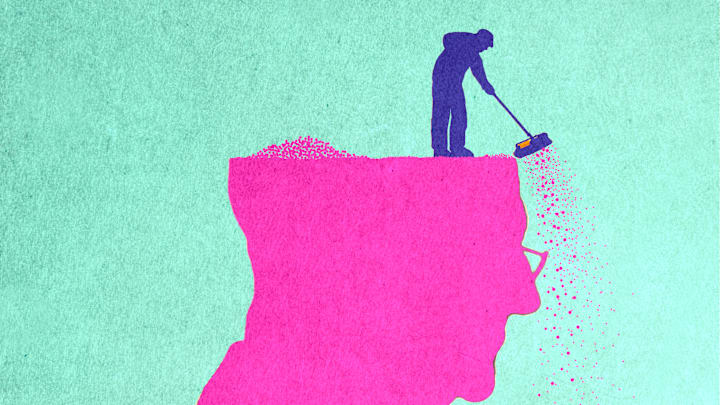Each year, Oxford University Press—the publisher behind the esteemed Oxford English Dictionary—chooses a word or phrase from the national discourse to be its Word of the Year. For 2024, their selection is a popular condemnation for consuming low-quality information. The unofficial mental health diagnosis is dubbed brain rot.
The OED defines brain rot (sometimes collapsed to brainrot) as “the supposed deterioration of a person’s mental or intellectual state, especially viewed as the result of overconsumption of material (now particularly online content) considered to be trivial or unchallenging. Also: something characterized as likely to lead to such deterioration.” In other words, one can suffer from brain rot by marathoning endless conspiracy theory videos, and the videos themselves can be labeled brain rot.
Per The New York Times, signs of brain rot can include the increased insertion of internet slang or meme references into everyday conversation. Those who take pride in their knowledge of online culture may interpret it as a compliment. Still, it’s mostly meant to indicate someone is losing touch with reality. In some cases, it’s labeled as a genuine mental health struggle: Connecticut’s Newport Institute, which offers inpatient counseling, regards brain rot as synonymous with digital or screen dependency.
Oxford’s methodology for plucking brain rot from a pile of buzzwords starts with editors selecting six words that saw increased usage and relevance over the past year. The online use of brain rot jumped 230 percent between 2023 and 2024. Public voting was also taken into account.
Here are the other candidates for Word of the Year:
Demure: A reserved and restrained appearance
Dynamic Pricing: The act of altering costs based on real-time demand
Lore: A body of knowledge surrounding a person or subject
Romantasy: A genre blending romance and fantasy
Slop: Pig feed, yes, but in this context low-grade content often generated by language models
Brain rot may have surged in the past year, but its use dates back to 1854, when Henry David Thoreau referenced it in his book Walden. He, too, wielded it to describe a diminished mental acuity. “While England endeavours to cure the potato rot, will not any endeavour to cure the brain-rot—which prevails so much more widely and fatally?”
In a statement acknowledging the rise of brain rot, Oxford Languages president Casper Grathwohl related the following: “Looking back at the Oxford Word of the Year over the past two decades, you can see society’s growing preoccupation with how our virtual lives are evolving, the way internet culture is permeating so much of who we are and what we talk about. Last year’s winning word, ‘rizz,’ was an interesting example of how language is increasingly formed, shaped, and shared within online communities. ‘Brain rot’ speaks to one of the perceived dangers of virtual life, and how we are using our free time. It feels like a rightful next chapter in the cultural conversation about humanity and technology. It’s not surprising that so many voters embraced the term, endorsing it as our choice this year.”
In some cases, being Word of the Year can affect a term’s usage. When Oxford announced rizz as its 2023 selection, the popularity of the term—slang for charisma, or an abundance of confidence—spiked.
